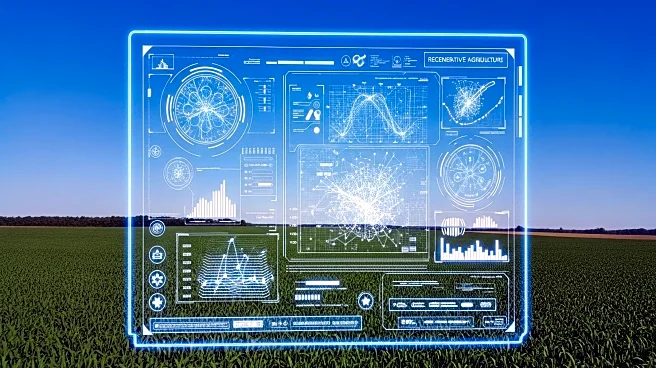What's Happening?
Klim, a technology company focused on regenerative agriculture, has launched a 'digital companion' tool designed to assist UK farmers and food and beverage companies in adopting regenerative agriculture practices. This tool aims to reduce the risks associated with weak data and lack of progress in regenerative agriculture by providing personalized, field-level recommendations. The digital companion simplifies the process for farmers by consolidating data input and offering tailored guidance, thereby eliminating the need for trial and error. Klim's platform is already supporting farmers in Germany and Poland, with a significant adoption rate among users.
Why It's Important?
The introduction of Klim's digital companion is crucial for advancing regenerative agriculture, a practice that is gaining traction among major food and beverage companies like Nestle, Danone, and PepsiCo. By providing a comprehensive digital solution, Klim addresses the challenges faced by farmers in transitioning to regenerative practices, such as short-term yield loss and financial uncertainty. This tool not only enhances farmer engagement but also enables food and beverage companies to gather reliable data and measure the impact of regenerative practices across their supply chains. The success of this initiative could lead to broader adoption of regenerative agriculture, promoting sustainability and resilience in the agricultural sector.
What's Next?
Klim plans to further enhance its digital tools by developing an AI-powered digital agent that will offer real-time support to farmers on regenerative agriculture questions. This new feature is expected to be released in the first quarter of 2026, providing farmers with even more personalized assistance. As Klim continues to expand its platform, it aims to bridge the gap between field data and corporate goals, ensuring that both farmers and food and beverage companies can effectively implement and report on regenerative practices.
Beyond the Headlines
The launch of Klim's digital companion highlights the growing importance of technology in agriculture, particularly in promoting sustainable practices. As regenerative agriculture becomes more mainstream, there may be cultural shifts in how farming is perceived and practiced. Additionally, the integration of digital tools in agriculture raises questions about data privacy and the ethical use of technology in farming. Ensuring that these tools are accessible and beneficial to all stakeholders will be key to their success.










